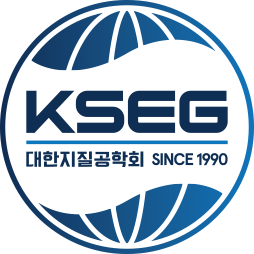Ethics
Ethics Charter for the Korean Society of Engineering Geology
The Korean Society of Engineering Geology is an academic organization dedicated to the benefit of the general public. In this regard, The Korean Society of Engineering Geology established the “Ethics Charter for the Korean Society of Engineering Geology” to provide ethical standards to be followed in the process of achieving the purpose of The Korean Society of Engineering Geology.
1. We will contribute to the development and dissemination of scholarship and technology related to the foundation and its application of engineering geology through the activities of the society, and to promote the public interest.
2. We do not contradict the purpose of the establishment of the society or impair the dignity of the society. We shall carry out academic activities and various projects fairly and faithfully and faithfully in accordance with ethics.
3. We disclose accurate scientific information from our research activities and actively make efforts to develop and disseminate technology.
4. We do not present a part of someone else's research or claim in a paper or writing as if it were his or her own research or claim, and we respect the copyrights of others.
5. We will review papers fairly and conduct technical advice honestly and responsibly in accordance with our academic conscience.
6. We shall not use the information obtained in connection with the conduct of the research and the review, unfairly or improperly.
Regulations on Research Ethics Committee for the Korean Society of Engineering Geology
Article 1 (Purpose) The purpose of the Regulations on Research Ethics Committee for the Korean Society of Engineering Geology is to establish research ethics by setting up standards and penalties for violations of the Ethics Charter and research misconduct by its officers and members.
Article 2 (Research Ethics)
1. We do not contradict the purpose of the establishment of the society or impair the dignity of the society, and conduct academic activities and various industries fairly and faithfully in accordance with ethics.
2. Academic objectivity shall be maintained throughout the course of research, and the source of the data shall not be disclosed or used without alteration, forgery, alteration or plagiarism, and the intellectual property of others shall not be used arbitrarily.
3. Papers submitted to the Korean Society of Engineering Geology shall not be submitted to other journals, nor shall papers submitted to other journals be duplicated on the Korean Society of Engineering Geology.
4. The authors of a research paper are limited to those who have actually contributed to the research work. Those who contributed to the research work shall not be omitted.
Article 3 (Composition of Research Ethics Committee and Terms of Members)
1. A Research Ethics Committee shall be established and operated to achieve the objectives of this Operating Regulation.
2. The members of the Research Ethics Committee shall consist of not more than nine members. The vice-chairmen of the Korean Society of Engineering Geology and the editor-in-chief shall be the current members, and the Chairman of the Research Ethics Committee shall be elected from among the vice-chairmen of the Korean Society of Engineering Geology.
3. The board of directors shall recommend the composition of the research ethics committee and appoint the research ethics committee members and shall be appointed by the chairman of the Korean Society of Engineering Geology.
4. The term of members shall be two years.
Article 4 (Function and Operation of Research Ethics Committee)
1. The Research Ethics Committee shall deliberate on the violation of the Research Ethics Charter and Research Ethics for members filed with the Research Ethics Committee.
2. In order to file to the Research Ethics Committee, at least 10 full members must be signed.
3. The member who is accused to the Research Ethics Committee shall cooperate with the investigation conducted by the Research Ethics Committee.
4. The Research Ethics Committee shall deliberate and make a decision within 60 days of the receipt of the complaint, and shall vote by 2/3 attendance and 2/3 vote of the present members, and report the result of the deliberation to the board of directors.
5. Examination of plagiarism of the thesis shall be conducted by the editorial board, and the results of the report will be notified to the Research Ethics Committee. Penalties and sanctions will be decided by the Research Ethics Committee.
Article 5 (Owning Opportunity and Confidentiality)
1. An examinee of the Research Ethics Committee shall not be considered to have violated the Research Ethics until it has been confirmed as a violation of the Research Ethics.
2. An examinee of the Research Ethics Committee shall be given sufficient opportunity to call for research ethics violations.
3. The identity of whistle blower must not be disclosed. the identity of examinee must not be disclosed before the research ethics committee's decision or if it is determined to be not a research misconduct.
4. The whistle blower or the examinee may appeal within 30 days of receiving notification if there is any objection to the decision, and the research ethics committee shall reinvestigate the objection if it is found to be valid.
Article 6 (Penalty and Sanctions)
1. The Research Ethics Committee shall announce it on the website of the Korean Society of Engineering Geology and report the decided penalty to the board of directors if the research misconduct is confirmed in violation of the Ethics Charter and Research Ethics.
2. Authors and papers whose research misconduct is confirmed may be subject to the following sanctions, as determined by the board of directors.
A) Cancellation of Publication of Research Results
B) Notification the relevant agencies of the facts
C) Prohibition of submission for 3 years or less
D) Suspension or loss of membership
Article 7 (Revision and Revocation of the Regulations on the Operation of the Research Ethics Committee) This Regulation may be amended and rescinded by the deliberation of the board of directors and the resolution of the general assembly.


 The Journal of Engineering Geology
The Journal of Engineering Geology








